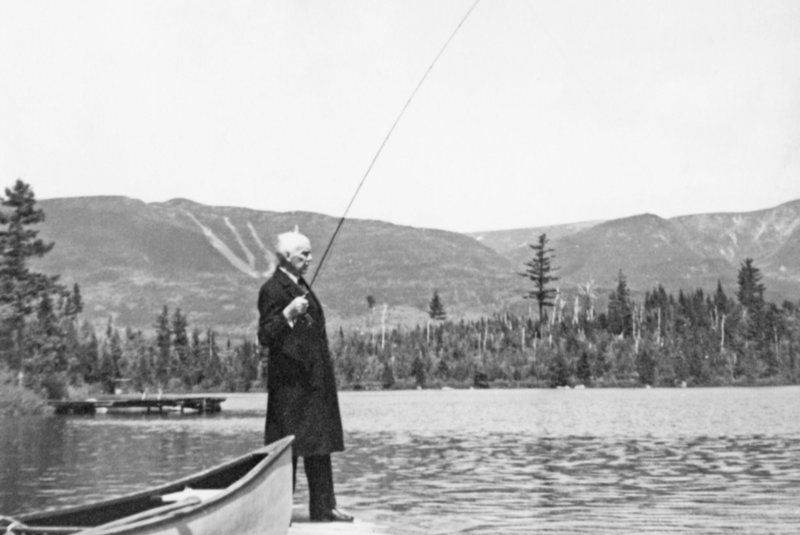WELD – Thanks to Deirdre Fleming for the May 19 story “City to celebrate Baxter’s legacy” informing readers about the upcoming tributes to Gov. Percival P. Baxter.
It is possible that we would not be celebrating Percy’s legacy but for an unexpected turn of events.
Baxter the legislator might never have become governor if not for Gov. Frederic Hale Parkhurst’s brief tenure. Parkhurst died in January 1921, shortly after collapsing in the House while giving his first State of the State address.
The two Republicans had been friends and colleagues in the Maine Senate, each man coming to state government from aristocratic families in their respective economic hubs of Bangor and Portland.
In the fall of 1920, Parkhurst, then a state senator, campaigned at the convention on the Warren G. Harding ticket, vowing to do as governor what Harding promised to do as president. Both Harding and Parkurst blitzed Maine on Election Day with landslide votes.
Harding is, of course, remembered for scandals and failures like Teapot Dome and the “normalcy” that led to the Great Depression.
We can only speculate as to the legacy of his would-be protege, whose untimely demise made a reluctant governor of the then newly elected Senate President Baxter.
Baxter, of course, has an immense legacy. An outspoken critic of Portland political powerbrokers the Ku Klux Klan, he tried unsuccessfully for years to convince fellow legislators that they should buy Katahdin.
Frustrated but rich, he would eventually do it himself.
Beyond Katahdin, Baxter spent years using his influence over what is considered one of the most important economic development policies in Maine history: The Fernald Act.
Fernald pitted Baxter against Central Maine Power titan Walter Wyman in the epic economic/environmental policy struggle of the early 20th century. Wyman sought to become rich by exporting hydro power to industrial and population centers south of Maine. Baxter insisted that such exportation — with its requisite exploitation of Maine resources — should only be allowed if it would benefit our state.
Both men eventually got what they wanted. Maine’s electrification was completed, driving a robust economy for several decades, and Wyman’s CMP did pretty well, too.
Fernald is a relevant policy that ought to be remembered a hundred years later as our mountain resources are exploited for the export of wind power.
Fleming’s story was accompanied by a photo of dinner jacket-clad Baxter fishing Kidney Pond: The summit in the background is Mount O-J-I, so named for its three iconic rock slides which then spelled its namesake letters.
Baxter in the photo is facing east toward nearby Katahdin.
A contemporary photo of Mount O-J-I shows that subsequent slides rendered the O-J-I letters undistinguishable, ironically reinforcing Baxter’s powerful statement made as he bestowed his great gift: “Buildings crumble, monuments decay, and wealth vanishes, but Katahdin in all its glory forever shall remain the mountain of the people of Maine.”
Like the unwitting Sen. Baxter learning of Parkhurst’s unexpected death in 1921, those of us today fighting the economic and environmental destruction that is mountain wind power are benefitting from unexpected economic and political forces.
Reliable options are rendering wind power unaffordable, unnecessary and useless even as political patience is waning.
This is good for Maine’s economy and environment. As one of the cleanest electricity generating states in the nation, having long ago gotten off oil and coal, Mainers must consider the legacy we will leave.
If mountaintop wind power goes the way of Parkhurst, some people might lament their good intentions unrealized. Others will lose potential riches. But Maine’s trademark quality of place — as valued by Gov. Baxter — will continue to benefit all of us.
Let us remember Baxter’s legacy as we create our own.
Chris O’Neil is president of Friends of Maine’s Mountains, an environmental organization.
Send questions/comments to the editors.



Success. Please wait for the page to reload. If the page does not reload within 5 seconds, please refresh the page.
Enter your email and password to access comments.
Hi, to comment on stories you must . This profile is in addition to your subscription and website login.
Already have a commenting profile? .
Invalid username/password.
Please check your email to confirm and complete your registration.
Only subscribers are eligible to post comments. Please subscribe or login first for digital access. Here’s why.
Use the form below to reset your password. When you've submitted your account email, we will send an email with a reset code.